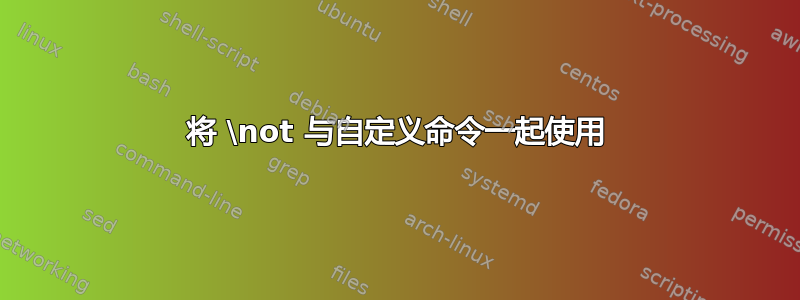
我有一个命令,一个复杂表达式的别名,我经常使用它,我想在不引入新别名的情况下否定它。
简单的解决方案是引入具有默认值的第三个参数,但写起来很混乱\myCommand[\neq]{arg1}{arg2},类似的方法\not\myCommand{arg1}{arg2}更好。
例子:
\newcommand{\divides}[2]{\ensuremath{#1\mid #2}}
感谢两位的回答,现在我知道该深入研究哪里了。
答案1
我建议使用 * 变体而不是前缀的语法\not。
\documentclass{article}
\usepackage{amsmath,amssymb}
\usepackage{xparse}
\NewDocumentCommand{\newrelation}{mmo}{%
% #1 is the command to define
% #2 is the relation to be used
% #3 (optional) is the alternative
\IfNoValueTF{#3}
{\NewDocumentCommand{#1}{smm}{%
\IfBooleanTF{##1}{##2\not#2##3}{##2#2##3}%
}%
}
{\NewDocumentCommand{#1}{smm}{%
\IfBooleanTF{##1}{##2#3##3}{##2#2##3}%
}%
}%
}
\newrelation{\EQ}{=}
\newrelation{\LESS}{<}
\newrelation{\divides}{\mid}[\nmid]
\begin{document}
$\EQ{a}{b}$ and $\EQ*{a}{b}$
$\LESS{a}{b}$ and $\LESS*{a}{b}$
$\divides{a}{b}$ and $\divides*{a}{b}$
\end{document}
说话\newrelation{\EQ}{=}相当于打字
\NewDocumentCommand{\EQ}{smm}{%
\IfBooleanTF{#1}% true if * is present
{#2\not=#3}%
{#2=#3}%
}
就像\newrelation{\divides}{\mid}[\nmid]输入
\NewDocumentCommand{\divides}{smm}{%
\IfBooleanTF{#1}% true if * is present
{#2\nmid#3}%
{#2\mid#3}%
}
例如,由于\not\in是错误的,你可以这样做
\newrelation{\IN}{\in}[\notin]
并且结果将得到适当的排版。同样,\not\mid给出的结果很糟糕,\nmid应该优先考虑。

如果您更喜欢使用前缀,这里是(相同的输出):
\documentclass{article}
\usepackage{amsmath,amssymb}
\usepackage{xparse}
\NewDocumentCommand{\newrelation}{mmo}{%
% #1 is the command to define
% #2 is the relation to be used
% #3 (optional) is the alternative
\IfNoValueTF{#3}
{%
\NewDocumentCommand{#1}{mm}{##1#2##2}%
\expandafter\NewDocumentCommand\csname negate\string#1\endcsname{mm}{##1\not#2##2}%
}%
{%
\NewDocumentCommand{#1}{mm}{##1#2##2}%
\expandafter\NewDocumentCommand\csname negate\string#1\endcsname{mm}{##1#3##2}%
}%
}
\makeatletter
\NewDocumentCommand{\negate}{m}{%
\@ifundefined{negate\string#1}
{\@latex@error{Undefined relation}{}#1}{\@nameuse{negate\string#1}}%
}
\makeatother
\newrelation{\EQ}{=}
\newrelation{\LESS}{<}
\newrelation{\divides}{\mid}[\nmid]
\begin{document}
$\EQ{a}{b}$ and $\negate\EQ{a}{b}$
$\LESS{a}{b}$ and $\negate\LESS{a}{b}$
$\divides{a}{b}$ and $\negate\divides{a}{b}$
\end{document}
答案2
需要进行设置工作,但可以完成。本质上,您必须定义各种宏来为各种符号执行所需的“A 符号 B”,然后必须定义\negate以了解如何依次否定每个符号。
\documentclass{article}
\usepackage{stackengine,xcolor,mathtools}
\def\eqsym{=}
\def\gtsymbol{>}
\let\svmid\mid
\let\svgtsymbol\gtsymbol
\newcommand{\divides}[2]{\ensuremath{#1\mid #2}}
\newcommand{\equals}[2]{\ensuremath{#1\eqsym #2}}
\newcommand\greaterthan[2]{\ensuremath{#1\gtsymbol #2}}
\newcommand\negate[1]{%
\ifx\divides#1\def\mid{\mathrlap{\,/}\svmid}\else%
\ifx\equals#1\let\eqsym\neq\else%
\ifx\greaterthan#1\def\gtsymbol{\mathrlap{\,\,/}\svgtsymbol}\else%
\fi\fi\fi%
#1%
}
\begin{document}
$\divides{1}{2} \quad \negate\divides{1}{2}$
$\equals{1}{2} \quad \negate\equals{1}{2}$
$\greaterthan{1}{2} \quad \negate\greaterthan{1}{2}$
$\divides{1}{2} \quad \equals{1}{2} \quad \greaterthan{1}{2}$
\end{document}

附录:
将 egreg 定义的可能易用性与我的方法的语法结合起来的一种方法是使用他的 MWE,并附加以下定义:
\def\negate#1{#1*}
以这种方式,
$\EQ{a}{b}$ and $\negate\EQ{a}{b}$
$\LESS{a}{b}$ and $\negate\LESS{a}{b}$
$\divides{a}{b}$ and $\negate\divides{a}{b}$
会产生与他的 MWE 相同的结果。


